Eoin MacNeill: The mind behind the Easter Rising?
Published in Featured-Archive-Post, Features, Issue 1 (January/February 2014), Volume 22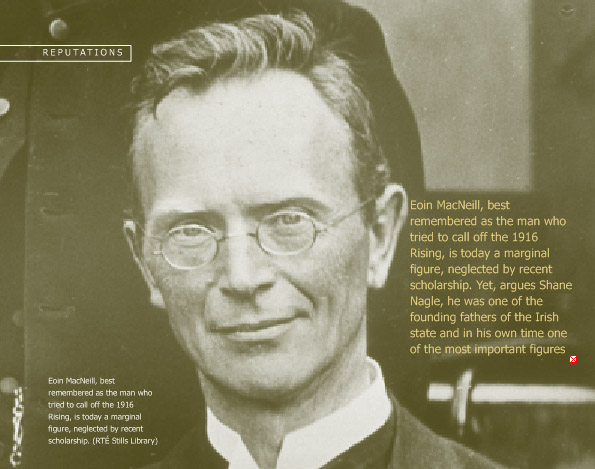 Eoin MacNeill (1867–1945) was above all a scholar, a historian of early and medieval Ireland, and an Irish linguist. His call for Irish nationalists to establish a militia in imitation of the Ulster Volunteers (in his article ‘The North began’), and his subsequent command of the Irish Volunteers, was what propelled him into a leadership position within the nationalist movement, though he was by no means militarily minded and saw such action as being justified only in strictly defensive terms. To the extent that MacNeill is remembered as one of the leading figures of the revolutionary period, it is usually as a pacifistic moderate more fitted for the lecture hall than for the cut and thrust of politics (never mind political violence), rather removed from the currents of the revolution. This is a selective understanding.
Eoin MacNeill (1867–1945) was above all a scholar, a historian of early and medieval Ireland, and an Irish linguist. His call for Irish nationalists to establish a militia in imitation of the Ulster Volunteers (in his article ‘The North began’), and his subsequent command of the Irish Volunteers, was what propelled him into a leadership position within the nationalist movement, though he was by no means militarily minded and saw such action as being justified only in strictly defensive terms. To the extent that MacNeill is remembered as one of the leading figures of the revolutionary period, it is usually as a pacifistic moderate more fitted for the lecture hall than for the cut and thrust of politics (never mind political violence), rather removed from the currents of the revolution. This is a selective understanding.
Influence on Patrick Pearse
MacNeill was in fact one of the ‘ideological’ fathers of that form of Irish nationalism that developed into violent separatism 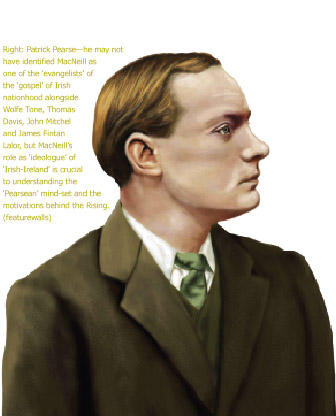 during the First World War and its aftermath. It is true that MacNeill’s position on political violence was not one of easy permissiveness, and he notably insisted in February 1916 that ‘what we call our country is not a poetical abstraction’. Nonetheless, the sense of Irishness that afforded motivation not only to those who went out to fight at Easter 1916 but also to the many others who would fight for or otherwise contribute actively to the cause of Irish Republicanism in the coming years was one that MacNeill did more than most others to define and popularise. He stood at the forefront of the Irish-Ireland movement in the late nineteenth/early twentieth century, and his activism meant nothing without his sincere convictions that Ireland undoubtedly had a historical right to independence, and that the Irish nation was fundamentally distinct not only from England or Britain but indeed from all others.
during the First World War and its aftermath. It is true that MacNeill’s position on political violence was not one of easy permissiveness, and he notably insisted in February 1916 that ‘what we call our country is not a poetical abstraction’. Nonetheless, the sense of Irishness that afforded motivation not only to those who went out to fight at Easter 1916 but also to the many others who would fight for or otherwise contribute actively to the cause of Irish Republicanism in the coming years was one that MacNeill did more than most others to define and popularise. He stood at the forefront of the Irish-Ireland movement in the late nineteenth/early twentieth century, and his activism meant nothing without his sincere convictions that Ireland undoubtedly had a historical right to independence, and that the Irish nation was fundamentally distinct not only from England or Britain but indeed from all others.
When we think of identifying ‘the mind’ of the Rising, our attention usually goes instantly to Patrick Pearse; yet, whatever Pearse’s importance, his writings suggest that he did not regard himself as an original thinker with respect to Irish nationalism, and that his idea of Irishness was ultimately owed to earlier influences. He may not have identified MacNeill as one of the ‘evangelists’ of the ‘gospel’ of Irish nationhood alongside Wolfe Tone, Thomas Davis, John Mitchel and James Fintan Lalor (nor would MacNeill have agreed too much with Pearse’s veneration of these men), but MacNeill’s role as ‘ideologue’ of ‘Irish-Ireland’ is crucial to understanding the ‘Pearsean’ mind-set and the motivations behind the Rising. The activity of both MacNeill and Pearse within the Gaelic Revival or Irish-Ireland movement and the Gaelic League (of which MacNeill was a co-founder) was a natural area of common ground, and MacNeill actively supported Pearse’s independent boys’ school, St Enda’s (intended to be a training ground for future generations of nationalists as well as a radical experiment in alternative education).
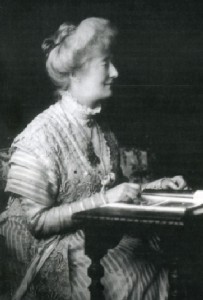
MacNeill’s influence can be found in the noted historian Alice Stopford Green, a leading nationalist activist and writer of a number of popular and authoritative national(ist) histories. (City Library, Belfast)
Ireland’s mission
The preoccupation of Irish nationalists since the eighteenth century with the state, at the expense of the nation’s ancient cultural integrity, had, MacNeill thought, been an insidious English influence, and necessarily foreign and antithetical to the true essential quality of Irish nationhood. He firmly believed, as a natural result of his belief in Irish particularity, that Ireland too had a ‘national mission’ to play in the world, as a teacher and guide of all nations, an example to the rest of the world in ‘ancient ideals, faith, learning, generous enthusiasm, self-sacrifice—the things best calculated to purge out the meanness of the modern world’. As he put it in Phases of Irish history, ‘in every intense and distinctive development of a nation, there dwells the actuality or potentiality of some great gift to the common good of mankind’. MacNeill rejected racism and racialist thinking; nonetheless, and firmly in the mainstream of European nationalist thinking, he believed that national cultures were essentially distinctive and that cosmopolitanism was the antithesis of patriotism. Not surprisingly, he held a dim view of English culture, regarding it as soulless and materialistic, ‘less mentally active, less self-sacrificing and less morally zealous’.
There is no doubting the profound importance of the ‘MacNeillist’ influence in these respects on P.H.
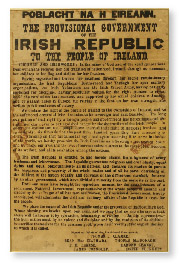
The word ‘republic’ seems largely absent from Pearse’s writings until the 1916 Proclamation.
Pearse. In his highly influential essay ‘The murder machine’ Pearse references MacNeill directly, and his comment that ‘the words and phrases of a language are always to some extent revelations of the mind of the race that has moulded the language’ is surely one with which MacNeill would have fully agreed. His refusal to accept a prima facie dichotomy between ‘Gael’ and ‘Gall’ is another point of common ground. When Pearse referred most approvingly to the Fenian Jeremiah O’Donovan Rossa’s veneration of the Gaelic tradition and his utter contempt for all things English (in his essay on Rossa, ‘A character study’, in The coming revolution), it fitted in with a ‘MacNeillian’ dichotomy of Irish (Gaelic-rooted, though not exclusively Gaelic) and English ‘civilisations’. His conception of the nation as a spiritual thing was fully in accord with MacNeill’s, even if the latter would not have accepted Pearse’s religious veneration of the nation. Pearse’s argument (in the essay ‘Ghosts’) that ‘the Irish mind is the clearest mind that has ever applied itself to the consideration of nationality and national freedom’ is directly parallel to MacNeill’s conception of the originality, antiquity and continuity of Irish nationhood. ‘Irish nationality is an ancient spiritual tradition, one of the oldest and most august traditions in the world’—the words were penned by Pearse (in ‘Ghosts’) but could just as well have come from MacNeill. Pearse’s evocation of the label ‘separatist’ as the central and uppermost category in his nationalist thinking is perhaps reflective of MacNeill’s lifelong disinclination to closely link nation and state, or particular concepts of politics and government, together. The word ‘republic’ seems largely absent from Pearse’s writings until the 1916 Proclamation, absent even in his Bodenstown address of 1913, and though Pearse is less reticent in his essay on Tone, ‘The separatist idea’, this is rather because he is expounding on Tone’s contribution to the history of Irish nationalism. When Pearse sums up Tone’s contribution in his own words at the end of this essay the word ‘republic’ is again absent.
MacNeill’s influence can be found in others, in particular the noted historian Alice Stopford Green, a leading nationalist activist and writer of a number of popular and authoritative national(ist) histories. The two arguably acted as an intellectual partnership, with Green doing much to popularise the fruits of MacNeill’s researches. To show his influence on Pearse, however, places him where he belongs, at the centre of a variant of Irish nationalism that at the least tended easily towards violent expression as the outcome of its definition of Irishness and, importantly, of the enemy ‘other’. MacNeill’s most important contributions lay in his ‘respectability’ and in the role he played in popularising a historical discourse of Irish particularity and even ‘superiority’, as well as his outlook on Ulster. MacNeill’s devout Catholicism, veneration of the Gaelic heritage and disdain for the ‘English’ contribution to Irish nationalism notwithstanding, he was utterly convinced of the indivisibility of Ulster from Ireland.
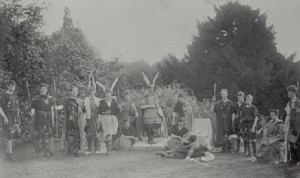
Pupils of St Enda’s enacting the pageant The Coming of Fionn. MacNeill actively supported Pearse’s independent boys’ school, intended to be a training ground for future generations of nationalists as well as a radical experiment in alternative education. (Pearse Museum)
His sense of Ulster as the occupied ‘heartland’ of the Irish nation would be the typical one of future generations of Irish nationalists (even when, in the next breath, they described Ulster as being a new ‘Pale’, and perhaps irredeemably Anglicised).
MacNeill broadened the appeal of Irish-Irelandism outside the bounds of the language movement, and he did not (to his credit) share the sectarian outlook of other such notable Irish-Irelanders as the polemical journalist D.P. Moran. Though MacNeill could never accept the veneration of the idea of ‘the Republic’ that would sustain Irish Republicanism, and though, as Brian Farrell put it, ‘MacNeill had an ingrained and persistently suspicious attitude towards the power of political myths that disciplined, and perhaps in the end enervated, his nationalism’, he deserves to be taken seriously (as he once was) as at least one of the ‘minds’ behind the form of Irish nationalism that lay behind the Rising. The challenges facing any new biographer of MacNeill aside, the enterprise would be a profitable one. HI
Shane Nagle was recently awarded a Ph.D on ‘Historical narratives and European nationalisms: Germany and Ireland in comparison’ from Royal Holloway, University of London.
Read More:
Suspicious of ‘statist’ nationalism
Further reading
E. MacNeill, Phases of Irish history (Dublin, 1920).
F.X. Martin & F.J. Byrne (eds), The scholar revolutionary: Eoin MacNeill, 1867–1945, and the making of the new Ireland (Shannon, 1973).
P.H. Pearse, The coming revolution: the political writings and speeches of Patrick Pearse (Cork, 2012).
M. Tierney, Eoin MacNeill: scholar and man of action, 1867–1945 (ed. F.X. Martin) (Oxford, 1980).
















